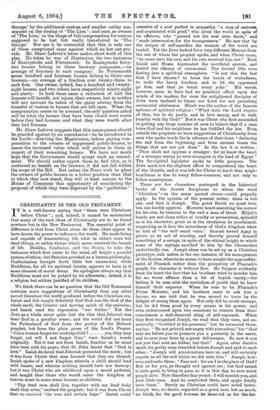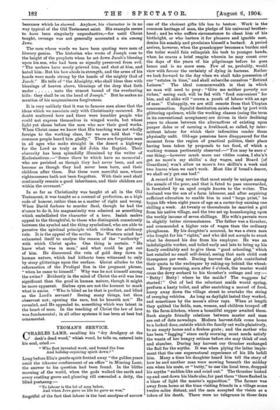We think there can be no question that the Old
Testament contains more suggestions of Christianity than any other sacred literature the world produced before the Christian era. Isaiah and Job taught definitely that God was the God of the whole earth, the Creator and moving spirit of the universe ; and Isaiah used the expression " our father." Yet the Jews as a whole never quite lost the idea that Jehovah was their God in a peculiar sense ; and the world did not learn the Fatherhood of God from the poetry of the Hebrew prophet, but from the plain prose of the Lord's Prayer.
" Can a woman forget her sucking child ? yea, they may forget, yet will I not forget thee," were Isaiah's words originally. Yet it was not from Isaiah, familiar as he must have been with his pages, that St. John learnt that " God is love." Isaiah declared that Jehovah protected the meek ; but it was from Christ that men learned that they are blessed. Isaiah spoke of a new kingdom wherein a child should lead wild beasts, and wherein nothing should hurt nor destroy ; but it was Christ who set childhood upon a moral pedestal, and taught that those who would enter the kingdom of heaven must in some sense become as children.
"Thy dead men shall live, together with my dead body shall they arise," exulted the prophet ; but it was from Christ that we received " the sure and certain hope." Isaiah could
conceive of a soul perfect in sympathy, " a man of sorrows, and acquainted with grief," who loved the world in spite of its offences, who " poured out his soul unto death," and " made intercession for the transgressors." He saw that by the stripes of self-sacrifice the wounds of the world are healed. Yet the Jews looked for a very different Messiah from the one of whom the prophet spoke, and when Christ came, " he came unto his own, and his own received him not." Both Isaiah and Hosea deprecated the sacrificial system, and denied the efficacy of ceremonial. The former lifts even fasting into a spiritual atmosphere. "Is not this the fast that I have chosen ? to loose the bands of wickedness, to undo the heavy burdens, and to let the oppressed go free, and that ye break every yoke." His words, however, seem to have had no practical effect upon the minds of his readers, for even the enlightened disciples of John were inclined to blame our Lord for not preaching ceremonial abstinence. Micah was the author of the famous epitome of spiritual religion : " What doth the Lord require of thee, but to do justly, and to love mercy, and to walk humbly with thy God?" But it was Christ who first succeeded in getting any large number of men to believe that if a man loves God and his neighbour he has fulfilled the law. Even outside the prophets we have suggestions of Christianity from men who spoke words far in advance of their time, " declaring the end from the beginning, and from ancient times the things that are not yet done." In the law it is written : " Thou shalt not oppress a stranger : for ye know the heart of a stranger seeing ye were strangers in the land of Egypt." The far-sighted legislator spoke to little purpose. The Jews made not the slightest effort to comprehend the heart of the Gentile, and it was left for Christ to teach that neigh- bourliness is due to every fellow-creature, and not only to fellow-countrymen.
There are few characters portrayed in the historical books of the Jewish Scriptures to whom the word " Christian "—in the sense quoted above—could properly apply. In the opinion of the present writer, there is but one, and that is Joseph. The great David we must love, but can hardly approve. However heart-searching his sorrow for his sins, he remains to the end a man of blood. Elijah's bands are not clean either of cruelty or persecution, splendid as is his character, great as is the revelation he proclaimed, suggesting as it does the inwardness of God's kingdom when he told of " the still small voice." Samuel hewed Agag in pieces as an act of worship, and thereby proved himself something of a savage, in spite of the ethical height to which some of the sayings ascribed to him by the Chroniclers undoubtedly rise. Joseph alone can be set up as a Christian prototype, and, unless in the one instance of his management of the famine, wherein he seems to have sought the aggrandise- ment of Pharaoh rather than the prosperity of Pharaoh's people, his character is without flaw. He forgave evidently from his heart the fact that his brothers tried to murder him for no worse offence than a bit of boyish vanity,—for letting it be seen with the unwisdom of youth that he knew himself their superior. When he rose to be Pharaoh's Prime Minister, and his brothers came to ask him a favour, we are told that he was moved to tears by the delight of seeing them again. Not only did he avoid revenge, but he did them good by every means in his power, and even endeavoured upon two occasions to remove from their consciences a well-deserved sting of self-reproach. When they first recognised Joseph, we read that they were, not un- naturally, "troubled at his presence," but he reassured them, saying : " Be not grieved, nor angry with yourselves," for " God sent me before you to preserve you a posterity in the earth, and to save your lives by a great deliverance. So now it was not you that sent me hither, but God." Again, after Jacob's death his guilty sons trembled before Joseph and said to each other: " Joseph will peradventure hate us, and will certainly requite us all the evil which we did unto him." Joseph, how- ever, said unto them : " Fear not : for am I in the place of God ? But as for you, ye thought evil against me ; but God meant it unto good, to bring to pass, as it is this day, to save much people alive. Now therefore fear ye not : I will nourish you, and your little ones. And he comforted them, and spike kindly unto. them." Surely no Christian could have acted better. Joseph was, no doubt, regarded as a great man, but as much, we think, for the good fortune he deserved as for the for-
bearance which he showed. Anyhow, his character is in no way typical of the Old Testament saint. His example seems to have been singularly unproductive,—for until Christ taught, revenge was not generally accounted a sin among Jews.
The men whose words we have been quoting were men of literary genius. The historian who wrote of Joseph rose to the height of the prophets when he set down Jacob's blessing upon his son, who had been so signally preserved from evil. " The archers have sorely grieved him, and shot at him, and hated him: But his bow abode in strength, and the arms of his hands were made strong by the hands of the mighty God of Jacob." He tells of " the Almighty, who shall bless thee with blessings of heaven above, blessings of the deep that lieth under unto the utmost bound of the everlasting bills: they shall be on the head of Joseph." But he makes no mention of his magnanimous forgiveness.
It is very unlikely that it was to famous men alone that the ideas which we associate only with Christianity occurred. No doubt scattered here and there were humbler people who could not express themselves in winged words, but whose light yet shone before the men who saw their good works. When Christ came we know that His teaching was not wholly foreign to the working class, for we are told that " the common people heard him gladly." There are forgotten men in all ages who make straight in the desert a highway for the Lord as truly as did John the Baptist. Their obscurity has been splendidly illumined by the writer of Ecclesiasticus :—" Some there be which have no memorial : who are perished as though they had never been, and are become as though they had never been born, and their children after them. But these were merciful men, whose righteousness bath not been forgotten. With their seed shall continually remain a good inheritance, and their children are within the covenant."
In so far as Christianity was taught at all in the Old Testament, it was taught as a counsel of perfection, as a high code of honour, rather than as a matter of right and wrong. When David forbore to murder Saul, though he had the chance to do it, his magnanimity was admired as something which embellished the character of a hero. Isaiah makes appeal to the thoughtful, to those who distinguish consciously between the symbol and the thing symbolised, who are able to perceive the spiritual principle which vivifies the arbitrary rule. It is the appeal of the scribe. The Western mind has exhausted itself to analyse the reason of the " authority " with which Christ spoke. One thing is certain. " He knew what was in man," and what could be got out of him. He discovered the vein of gold deep down in human nature, which bad hitherto been witnessed to only by stray glitterings upon the surface. Christ alludes to the reformation of the Prodigal Son in the pregnant phrase, "when he came to himself." Why was he not himself among the swine? Evidently in the mind of Christ the evil was less significant than the good in human nature, though it might be more apparent. Sinless eyes are not the keenest to mark what is amiss. "Who is blind as he that is perfect, and blind as the Lord's servant? Seeing many things, but thou observest not; opening the ears, but he heareth not." He revealed, and He appealed to, something which was latent in the heart of man. In the teaching of Christ the law of love was fundamental ; in all other systems it has been at best but ornamental.
YEOMAN'S SERVICE.







































 Previous page
Previous page